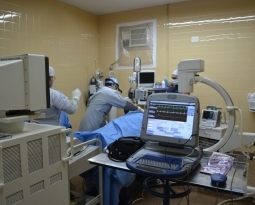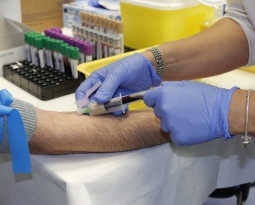Tennessee Patent of the Month – June 2023
Poly- and perfluoroalkyl substances (PFAS) have become a significant environmental concern due to their widespread use and potential health hazards. These “forever chemicals” are highly stable and do not biodegrade which means they accumulate in the environment and never go away. This poses a serious challenge for their elimination from wastewater biosolids. While many companies are working towards finding solutions for this accumulation, Aries Clean Technologies, LLC is already patenting a promising solution. Their method involves fluidized bed (FB) gasification.
In the FB gasifier, biosolids are fed into a bed of solid particles, where they undergo gasification and decomposition at extreme temperatures ranging from 900 to 1800 degrees Fahrenheit. This process converts the PFAS compounds into synthesis gas (syngas). The syngas is then combusted in a thermal oxidizer at temperatures of 1600 to 2600 degrees Fahrenheit, further decomposing the PFAS and generating flue gas.
To ensure efficient PFAS removal and emission control, the heated flue gas is cooled in a heat exchanger, reducing its temperature to a range of 400 to 1200 degrees Fahrenheit. Hydrated lime is injected into the cooled flue gas, enhancing PFAS decomposition. The spent lime is subsequently removed from the gas stream using a filter system, which may incorporate catalyst impregnated filter elements.
The elimination of PFAS from wastewater biosolids using this innovative apparatus and method offers several advantages. By utilizing FB gasification, the process achieves high conversion rates and provides flexibility in handling various feedstock types. The control of reaction temperature enables efficient gasification without the need for extensive pre-processing. Moreover, the inclusion of a thermal oxidizer ensures complete PFAS decomposition, preventing the formation of harmful byproducts.
Current methods of disposal can be environmentally harmful and are increasingly regulated and restricted. This applies to landfills, land applications, incineration, and even composting. The Aries Clean Technologies invention addresses the limitations of existing PFAS removal techniques, such as incineration and pyrolysis. While incineration requires high temperatures and extended residence times, pyrolysis alone may not effectively decompose stable PFAS compounds. In contrast, the FB gasification method offers a comprehensive solution, eliminating PFAS from wastewater biosolids and controlling emissions.
The company has dedicated 10 years of product development and two full-scale operational facilities for testing to ensure their process is both effective and safe. Every year, the U.S. alone produces seven million dry tons of biosolids (treated sludge). With the continuous production of biosolids, this type of sustainable solution can make a pivotal difference in addressing the human waste dilemma.
Are you developing new technology for an existing application? Did you know your development work could be eligible for the R&D Tax Credit and you can receive up to 14% back on your expenses? Even if your development isn’t successful your work may still qualify for R&D credits (i.e. you don’t need to have a patent to qualify). To find out more, please contact a Swanson Reed R&D Specialist today or check out our free online eligibility test.
Who We Are:
Swanson Reed is one of the U.S.’ largest Specialist R&D tax advisory firms. We manage all facets of the R&D tax credit program, from claim preparation and audit compliance to claim disputes.
Swanson Reed regularly hosts free webinars and provides free IRS CE and CPE credits for CPAs. For more information please visit us at www.swansonreed.com/webinars or contact your usual Swanson Reed representative.

















